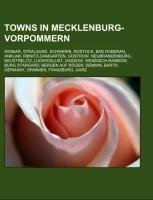
-
 Anglický jazyk
Anglický jazyk
Towns in Mecklenburg-Vorpommern
Source: Wikipedia. Pages: 54. Chapters: Wismar, Stralsund, Schwerin, Rostock, Bad Doberan, Anklam, Ribnitz-Damgarten, Güstrow, Neubrandenburg, Neustrelitz, Ludwigslust, Dassow, Wendisch-Rambow, Burg Stargard, Bergen auf Rügen, Demmin, Barth, Germany, Grimmen,... Viac o knihe
Na objednávku
16.83 €
bežná cena: 18.70 €
O knihe
Source: Wikipedia. Pages: 54. Chapters: Wismar, Stralsund, Schwerin, Rostock, Bad Doberan, Anklam, Ribnitz-Damgarten, Güstrow, Neubrandenburg, Neustrelitz, Ludwigslust, Dassow, Wendisch-Rambow, Burg Stargard, Bergen auf Rügen, Demmin, Barth, Germany, Grimmen, Franzburg, Garz, Kühlungsborn, Wolgast, Usedom, Jarmen, Schwaan, Neukloster, Ueckermünde, Stavenhagen, Woldegk, Warin, Strasburg, Germany, Sassnitz, Schönberg, Mecklenburg-Vorpommern, Trassenheide, Boizenburg, Sternberg, Mecklenburg-Vorpommern, Pasewalk, Putbus, Mirow, Zarrentin, Borrentin, Malchow, Grabow, Gadebusch, Neustadt-Glewe, Parchim, Röbel, Altentreptow, Friedland, Mecklenburg-Vorpommern, Teterow, Wittenburg, Grevesmühlen, Hagenow, Goldberg, Germany, Eggesin, Gützkow, Neubukow, Penkun, Wesenberg, Mecklenburg-Vorpommern, Malchin, Krakow am See, Dargun, Klütz, Plau am See, Crivitz, Neukalen, Tessin, Germany, Dömitz, Bützow, Brüel, Rerik, Richtenberg, Torgelow, Bad Sülze, Tribsees, Loitz, Kröpelin, Rehna, Laage, Lassan, Germany, Lübz, Lübtheen, Penzlin, Gnoien, Marlow, Germany, Ahlbeck, Bansin, Juliusruh, Spoitgendorf. Excerpt: Rostock (German pronunciation: , from Polabian Roztok, literally "flowing apart") is the largest city in the north German state Mecklenburg-Vorpommern. Rostock is located on the Warnow river; the quarter of Warnemünde 12 km north of the city centre lies directly on the coast of the Baltic Sea. Confirmation of Lübeck law city rights, 1218In the 11th century Polabian Slavs founded a settlement at the Warnow river called Roztoc (which means broadening of a river); the name Rostock is derived from that designation. The Danish king Valdemar I set the town aflame in 1161. Afterwards the place was settled by German traders. Initially there were three separate cities: The rise of the city began with its membership of the Hanseatic League. In the 14th century it was a powerful seaport town with 12,000 inhabitants and the biggest city of Mecklenburg. Ships for cruising the Baltic Sea were constructed in Rostock. In 1419 one of the oldest universities in Northern Europe, the University of Rostock, was founded. At the end of the 15th century the dukes of Mecklenburg succeeded in enforcing their rule over the town of Rostock, which had until then been only nominally subject to their rule and essentially independent. They took advantage of a riot known as Domfehde, a failed uprising of the impoverished population. Subsequent quarrels with the dukes and persistent plundering led ultimately to a loss of economic and political power. Rostock 1780-90The strategic location of Rostock provoked the envy of its rivals. Danes and Swedes occupied the city twice, first during the Thirty Years' War (1618-48) and again from 1700 to 1721. Later, the French, under Napoleon, occupied the town for about a decade until 1813. It was in nearby Lübeck-Ratekau that Blücher, who was actually born in Rostock and who was one of few generals to fight on after the Battle of Jena, surrendered to the French in 1806. This was only after furious street fighting in the Battle of Lübeck, in which he led some of
- Vydavateľstvo: Books LLC, Reference Series
- Rok vydania: 2012
- Formát: Paperback
- Rozmer: 246 x 189 mm
- Jazyk: Anglický jazyk
- ISBN: 9781156874165





 Ruský jazyk
Ruský jazyk 






